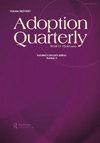男女同性恋收养:葡萄牙专业人员面临的挑战和培训需求
IF 0.6
Q3 SOCIAL WORK
引用次数: 6
摘要
摘要女同性恋和男同性恋在完成父母项目时面临许多障碍,包括在寻求收养时。在葡萄牙,同性伴侣的收养最近被允许,我们试图了解收养专业人士对这一问题的看法。我们使用半结构化的采访脚本,与收养专业人士进行了两次焦点小组讨论。我们旨在探讨(i)LGs和同性伴侣收养的主要挑战;(ii)关于这些家庭环境的知识、技能和个人信仰;(iii)性别(夫妻、子女)在匹配过程中的重要性;以及(iv)在该领域的任何培训中要解决的主题。参与者的话语在对普遍存在的社会偏见和对性少数群体的歧视的某种认识和非规范话语之间摇摆。确定了与这一群体合作的挑战和培训的必要性。研究结果表明,需要为LG申请人的家庭研究和文化能力培训制定指导方针,以在三个方面应对这一人群:知识、技能和个人态度意识。本文章由计算机程序翻译,如有差异,请以英文原文为准。
Adoption by Lesbian Women and Gay Men: Perceived Challenges and Training Needs for Professionals in Portugal
Abstract Lesbian women and gay men face many barriers to accomplish a parental project, including when seeking to adopt. In Portugal, same-sex couple’s adoption was recently allowed and we sought to understand adoption professionals’ perspectives regarding this issue. We conducted two focus groups with adoption professionals using a semi-structured interview script. We aimed to explore (i) the main challenges for adoption by LGs and same-sex couples; (ii) knowledge, skills, and personal beliefs regarding about these family settings; (iii) the importance of gender (couples, child) in the matching process; and (iv) topics to address in any training for this area. The participants’ discourses oscillated between a certain awareness of the prevailing social prejudice and discrimination toward sexual minorities on one hand and a heteronormative discourse on the other hand. Challenges in working with this population and training necessities were identified. Findings point to the need for guidelines for the home study of LG applicants and cultural competency training to deal with this population in three aspects: knowledge, skills, and awareness of personal attitudes.
求助全文
通过发布文献求助,成功后即可免费获取论文全文。
去求助
来源期刊

Adoption Quarterly
SOCIAL WORK-
CiteScore
1.60
自引率
12.50%
发文量
3
期刊介绍:
Adoption Quarterly is an unparalleled forum for examining the issues of child care, of adoption as viewed from a lifespan perspective, and of the psychological and social meanings of the word "family." This international, multidisciplinary journal features conceptual and empirical work, commentaries, and book reviews from the fields of the social sciences, humanities, biological sciences, law, and social policy. In addition to examining ethical, biological, financial, social and psychological adoption issues, Adoption Quarterly addresses continuity in adoption issues that are important to both practitioners and researchers, such as: negotiation of birth and adoptive family contact.
 求助内容:
求助内容: 应助结果提醒方式:
应助结果提醒方式:


